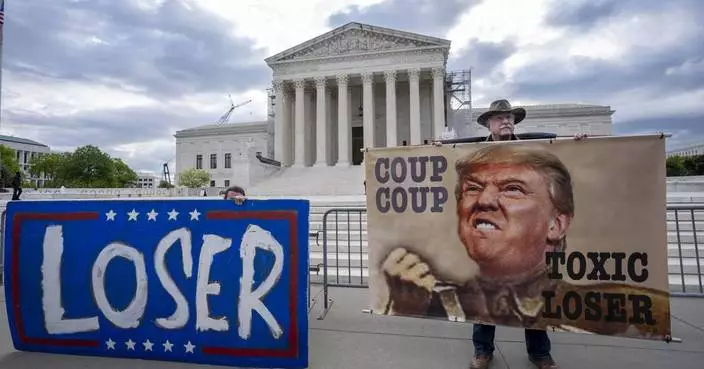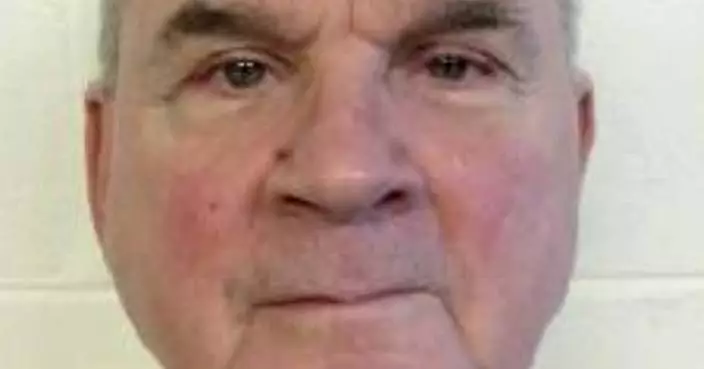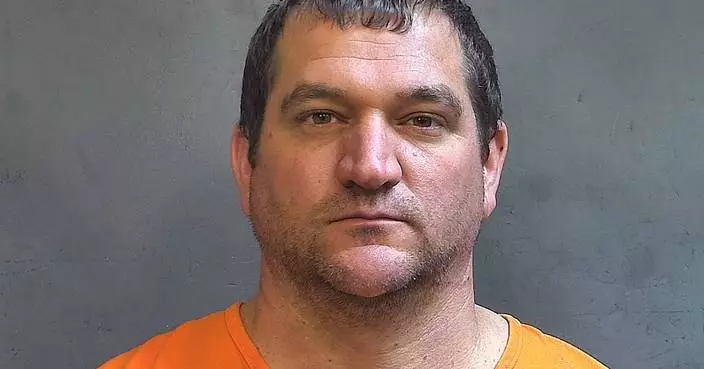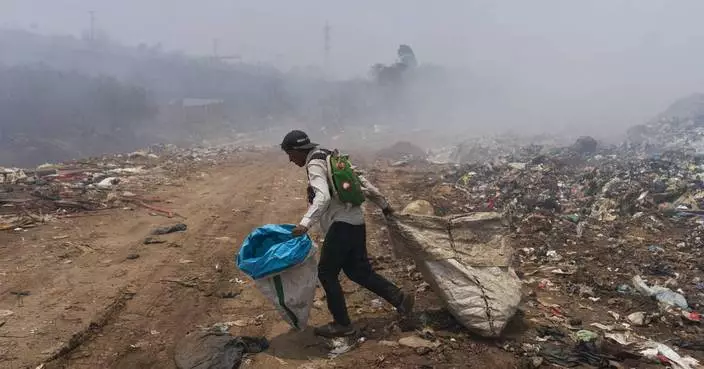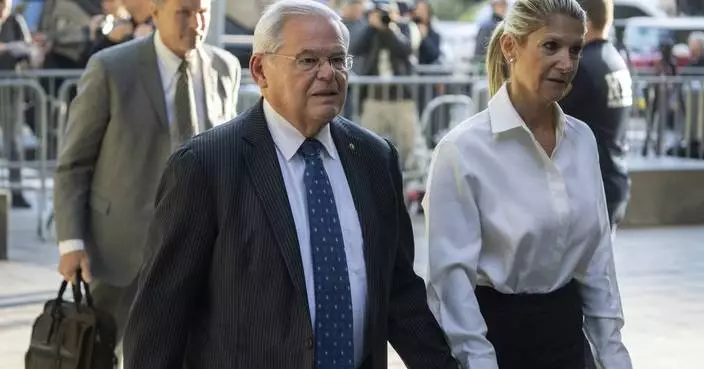Lisa is desperate to buy Nick more time with their miracle twin boys – born after two tragic stillbirths.
A wife whose husband has been told there is nothing more the NHS can do to treat his ultra-rare cancer has turned to strangers for help raising the £200,000 needed to buy him more time with their twin toddlers – born after a series of devastating stillbirths.
For stay-at-home mum Lisa Dipper, 37, and her project manager husband Nick, 51, the road to parenthood was paved with heartache, as they suffered two tragic stillbirths in 2013 and 2014, before the birth of their miracle twins, Ely and Ezra in October 2015.
Life looked brighter for the devoted couple, of Henley-on-Thames, Oxfordshire, only for their world to be turned upside down again in 2018, when Nick was diagnosed with nasopharyngeal carcinoma – a rare cancer affecting the part of the throat connecting the back of the nose and mouth – after months of headaches and sinus pain.
After a terrifying brush with sepsis – a life-threatening response to an infection – he was given the all clear in January 2019, only for a scan weeks later to reveal that the cancer had spread to his bones, liver and lungs.
Offered only palliative care by the NHS, determined to keep her husband alive, Lisa is crowdfunding for the £140,000 to £200,000 they need for private immunotherapy – a treatment that boosts the body’s natural defences to fight cancer.
Lisa, who has learnt that she is unable to get immunotherapy to treat Nick’s particular type of cancer on the NHS, said: “After everything we’ve been through, I can’t bear the thought of being without Nick and bringing up the boys alone.”
She added: “Right now, we feel as if we’ve been sent to war with no weapons – but I am willing to do whatever it takes. Any extra time we manage to buy with Nick, I’ll be singing from the rooftops.”
The couple have already been through emotional hell, after both their daughters, Eden and Hope, were stillborn – with scans at around 29 weeks finding neither baby had a heartbeat.
They do not know why they had two stillbirths but, after their crushing loss, they took some time out from their quest to start a family and were married in Thailand in June 2014, going on to discover they were expecting again in early 2015.
Following a closely-monitored pregnancy, Lisa, who is originally from Huddersfield, West Yorkshire, welcomed Ely and Ezra into the world in October 2015, at 31 weeks.
She recalled: “We were in neonatal intensive care for seven weeks, but the boys have absolutely thrived from that point on. After everything we’d been through, we were just enjoying being parents, adapting to twin life and having a little normality.”
But then, in October 2017, Nick began to complain of headaches.
Visiting the doctor, he was told he probably had sinusitis – a swelling of the sinus usually caused by an infection – and given antibiotics.
When they did not work, he was then prescribed a string of different types of antibiotic – all of which had no effect.
“By February 2018, he had also started to lose weight. Fairly rapidly, he shed about a stone-and-a -half,” said Lisa. “We went back to the doctor and were immediately referred to an ear, nose and throat specialist. By that point, poor Nick was in agony. At our appointment, the consultant felt his glands and knew right away that something was very wrong.”
After a series of tests, including a biopsy, he was officially diagnosed with nasopharyngeal carcinoma at Royal Berkshire Hospital.
Classed as stage three, the disease had spread to a bone in his skull and lymph nodes in his neck.
Immediately admitted to hospital, he began gruelling treatment, which included eight sessions of chemotherapy, and 30 rounds of radiotherapy.
“That was horrendous – especially the radiotherapy. He could barely speak, couldn’t swallow and lost his taste and smell,” said Lisa. “He was literally burnt inside and out. Somehow, he made it through every last bit of treatment though.”
Once the 30 rounds of radiotherapy had ended, Nick was supposed to have a 12-week recovery period to give his body a chance to recover from the side-effects. But in early December, he rapidly declined.
Speaking of how things came to a head in the early hours of 3 December, Lisa recalled: “Nick seemed really quite unwell. I remember his pupils being pinpoints. I phoned the hospital and they said to monitor his temperature every two hours and come right in if it spiked.”
She continued: “Something in me – maybe it was intuition – set in, because about 10 minutes before my 5am alarm to check him went off, I woke up anyway, rolled over, to see him quite literally drowning in fluid that had built up in his lungs. It was harrowing.”
Jumping into action, Lisa phoned 999 and Nick was raced to hospital, where doctors discovered he had developed cold sepsis – hence why his temperature had not spiked, which is often a tell-tale sign of the condition.
Things were so severe that his kidneys had started to fail and his body had stopped processing the morphine he had been taking for pain properly.
“He had to have medication to almost reverse the morphine to stop his body overdosing, which sent him into horrendous pain,” said Lisa. “I remember all these clusters of doctors around working on him, but Nick just looking at me, right in the eye, as if to say, ‘Help me.’”
Next, Nick had a chest drain, which Lisa said saw a “bucket” of pus and fluid come away from his lungs, both of which had collapsed, before being transferred to the more specialist John Radcliffe Hospital in Oxford for emergency surgery.
“When he was wheeled to theatre, I had no idea if he’d be coming back out again,” said Lisa. “But he managed to get rid of the infection and responded amazingly well. He was, against the odds, even home for Christmas, arriving at about 8pm on Christmas Eve.”
Finally, in January 2019, the Dippers were given some longed-for good news when an MRI scan of Nick’s head and neck showed no traces of cancer.
Because there were still indications of the sepsis infection in his body, however, the couple were advised to wait until he was completely well again and to have a full body scan, to avoid getting incorrect results.
“We completely understood that and knew the infection and inflammation could come up on the scan mistakenly and cloud the results,” said Lisa.
Sadly, their joy was short-lived, as just weeks later, Nick had an emergency PET scan, after experiencing sciatic pain, which revealed that, while the cancer was no longer in his head and neck, it had spread to his spine, shoulder, right hip, sternum, liver and left lung.
Lisa added: “Hearing that was unimaginable. We were told that the only other option available on the NHS was palliative care, but I simply couldn’t take him home to die.
“I spoke to an oncologist friend who suggested I talk about immunotherapy. Initially, we thought we’d be able to have it, but it turned out that the license the NHS has does not extend to Nick’s rare type of cancer.”
Now, determined not to give up hope, the family have launched a GoFundMe page, which they are hoping will help raise the £140,000 to £200,00 needed for private treatment.
So far, donations have flooded in, with almost £30,000 raised in a matter of days – but Lisa is all too aware that time is of the essence.
She said: “I’d book the treatment tomorrow if I could, but I never expected it to be as expensive as it is. We have put in an individual funding request to our NHS Trust, but also know that time is the most important thing and we can’t face a wait right now.”
She concluded: “I want to thank anybody that has helped with our GoFundMe page so far, and will do all I can to help make sure Nick is around to watch our beautiful boys grow up.”
Dr Janet Lippett, Care Group Director Networked Care for the Royal Berkshire NHS Foundation Trust said: “In cases where patients have a rare or complex condition all potential treatment options are considered.
“Where treatment is not routinely available on the NHS, or as part of a clinical trial, we help patients explore all alternative funding options such as an individual funding request, and compassionate use from the appropriate pharmaceutical company. We understand this is a very difficult time and hope that the family are able to find a resolution.”
An NHS England spokesperson said: “Immunotherapy is available to treat a range of cancers on the NHS, where it is not routinely commissioned for treating a specific cancer an Individual funding requests can be submitted.”
To donate, visit www.gofundme.com/team-dipper-needs-you or www.justgiving.com/crowdfunding/teamdipper
AUGUSTA, Maine (AP) — An Army reservist and friend of the gunman behind Maine’s deadliest mass shooting testified Thursday about his friend's mental decline, describing publicly for the first time the warning he issued a month before the tragedy unfolded.
Sean Hodgson texted leaders of his reserve unit six weeks before the shooting that left 18 people dead and 13 wounded, telling them to change the passcode to the gate at their Army Reserve training facility and arm themselves if Robert Card showed up.
Hodgson told a panel investigating the mass shooting on Thursday that he issued the warning to superiors after Card’s delusional and violent behavior spiraled and ended with Card punching him in the face.
“I said ‘Just so you know, I love you. I’ll always be there for you. I won’t give up on you.’ He had that blank stare on his face. It was a dead stare and he drove away,” Hodgson recounted as his friend left him at a gas station.
The attacks happened six months ago on Oct. 25 when Card opened fire at a bowling alley and a bar in Lewiston, two locations where he held a delusional belief that people were talking about him behind his back. Two days later, the 40-year-old Reservist was found dead of a self-inflicted gunshot wound.
Hodgson told superiors on Sept. 15: “I believe he’s going to snap and do a mass shooting.”
But it wasn't just Hodgson who was worried about Card. Several other reservists witnessed his deterioration during training last summer. That led to a two-week hospitalization in July for Card, months after relatives warned police he had grown paranoid and that they were concerned about his access to guns.
The failure of authorities to remove Card’s weapons in the weeks before the shooting has become the subject of a monthslong investigation in the state, which also has passed new gun safety laws since the tragedy.
In an interim report released last month, an independent commission launched by Gov. Janet Mills concluded that the Sagadahoc County sheriff’s office had probable cause under Maine’s “yellow flag” law to take Card into custody and seize his guns. It also criticized police for not following up with Hodgson about his warning text. A final report is expected this summer.
On Thursday, Hodgson said he warned of a mass shooting because Card threatened multiple members of the unit with violence and that his threats and delusions were escalating. And he had access to guns.
“The way he was behaving was very threatening. It was escalating. The totality of the circumstances, the events leading to that moment, I was pretty convinced he was going to cause harm,” he said.
Another reservist, Daryl Reed, testified he witnessed Card’s mental and physical decline firsthand, seeing a “normal guy” who successfully traded stocks and loved hunting and the outdoors become increasingly paranoid and believing others were calling him a pedophile.
Card also acquired a thermal scope with a laser range finder that he said cost $10,000, and he demonstrated how it could be used to detect animals, including at night, Reed said.
He added fellow reservists started to become concerned Card could become a danger to colleagues. They were surprised, several testified, when Card was released from a psychiatric hospital after only two weeks.
In an exclusive series of interviews in January, Hodgson told The Associated Press he met Card in the Army Reserve in 2006 and that they became close friends after both divorced their spouses around the same time. They lived together for about a month in 2022, and when Card was hospitalized in New York in July, Hodgson drove him back to Maine.
Growing increasingly worried about his friend’s mental health, Hodgson warned authorities after Card started “flipping out” after a night of gambling, pounding the steering wheel and nearly crashing multiple times. After ignoring his pleas to pull over, Card punched him in the face, Hodgson said.
“It took me a lot to report somebody I love,” he said. “But when the hair starts standing up on the back of your neck, you have to listen.”
Some officials downplayed Hodgson’s warning, suggesting he might have been drunk because of the late hour of his text. Army Reserve Capt. Jeremy Reamer, the commanding officer of the reserve unit, described him as “not the most credible of our soldiers” and said his message should be taken “with a grain of salt.”
Hodgson said he struggles with post-traumatic stress disorder and alcohol addiction but said he wasn’t drinking that night and was awake because he works nights and was waiting for his boss to call. “I grieve every day for the many lives that are lost for no reason and those that are still affected today,” he told the AP earlier this month.
Cara Cookson, director of victim services for the Maine Office of the Attorney General, also testified Thursday and described through tears the daunting task of responding to the enormity of the tragedy with a “patchwork of resources.”
On Thursday evening, the Maine Resiliency Center, which provides support to people affected by the killings, held a six-month commemoration event that drew several hundred people to a park in Lewiston.
The names of the 18 people who died were read aloud at the start of the ceremony, and there were 18 empty chairs, each with a candle and a blue heart, honoring the victims.
The governor also acknowledged the anniversary. “Our hearts are still healing, and the road to healing is long, but we will continue to walk it together,” Mills said in a statement.
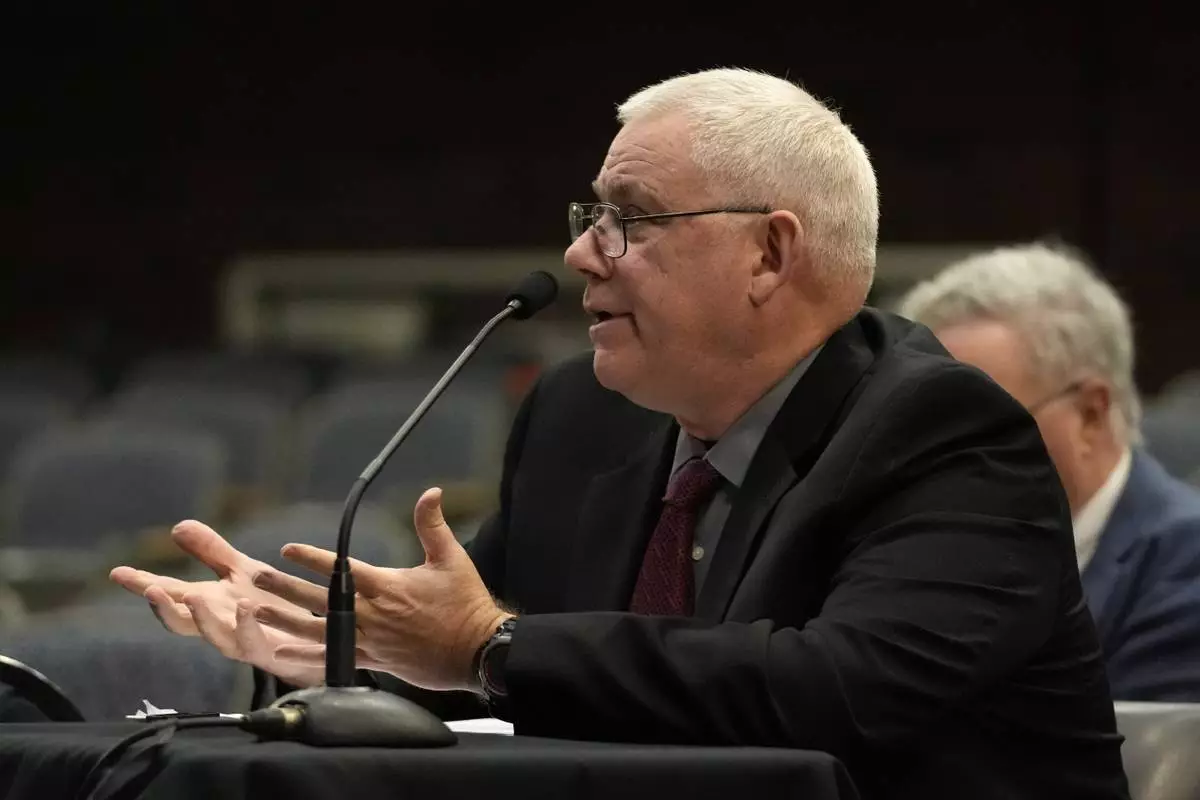
Ed Yurek, a member of the U.S. Army Reserve, gives testimony, Thursday, April 25, 2024, in Augusta, Maine, during a hearing of the independent commission investigating the law enforcement response to the mass shooting in Lewiston, Maine. (AP Photo/Robert F. Bukaty)
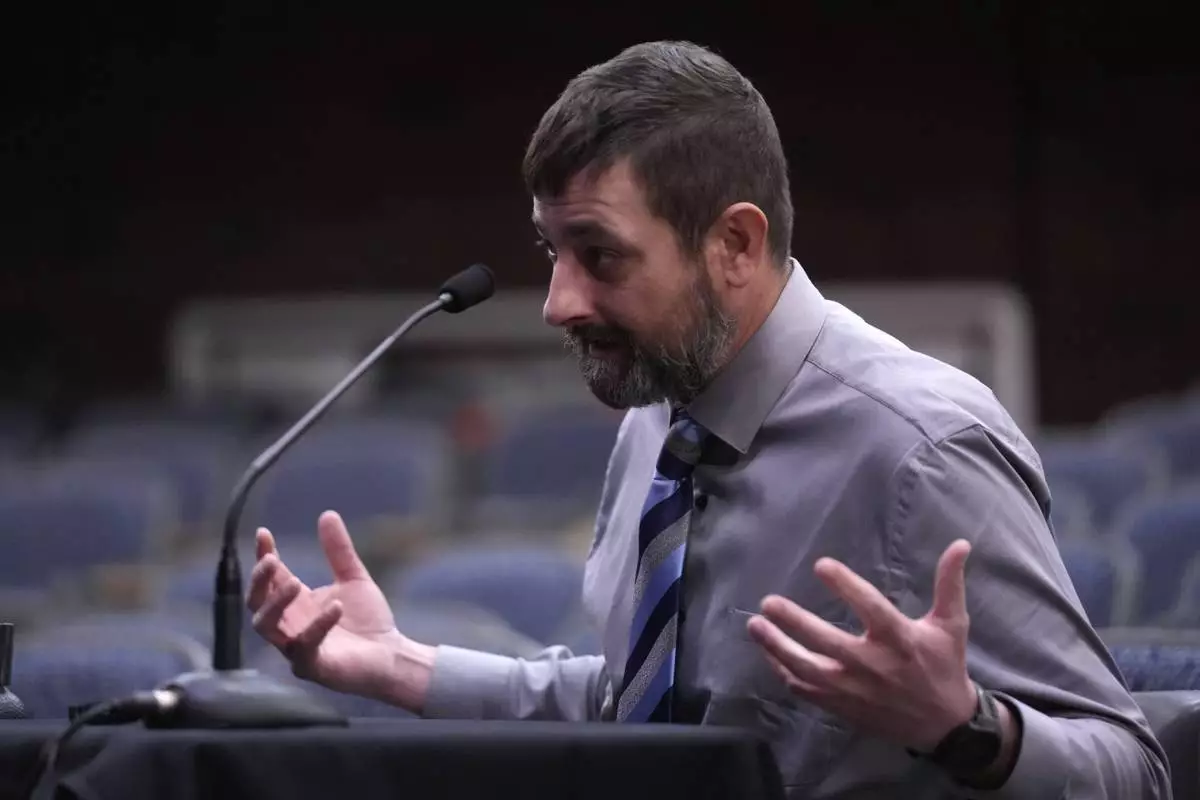
Sean Hodgson, a member of the U.S. Army Reserve, gives testimony, Thursday, April 25, 2024, in Augusta, Maine, during a hearing of the independent commission investigating the law enforcement response to the mass shooting in Lewiston, Maine. (AP Photo/Robert F. Bukaty)
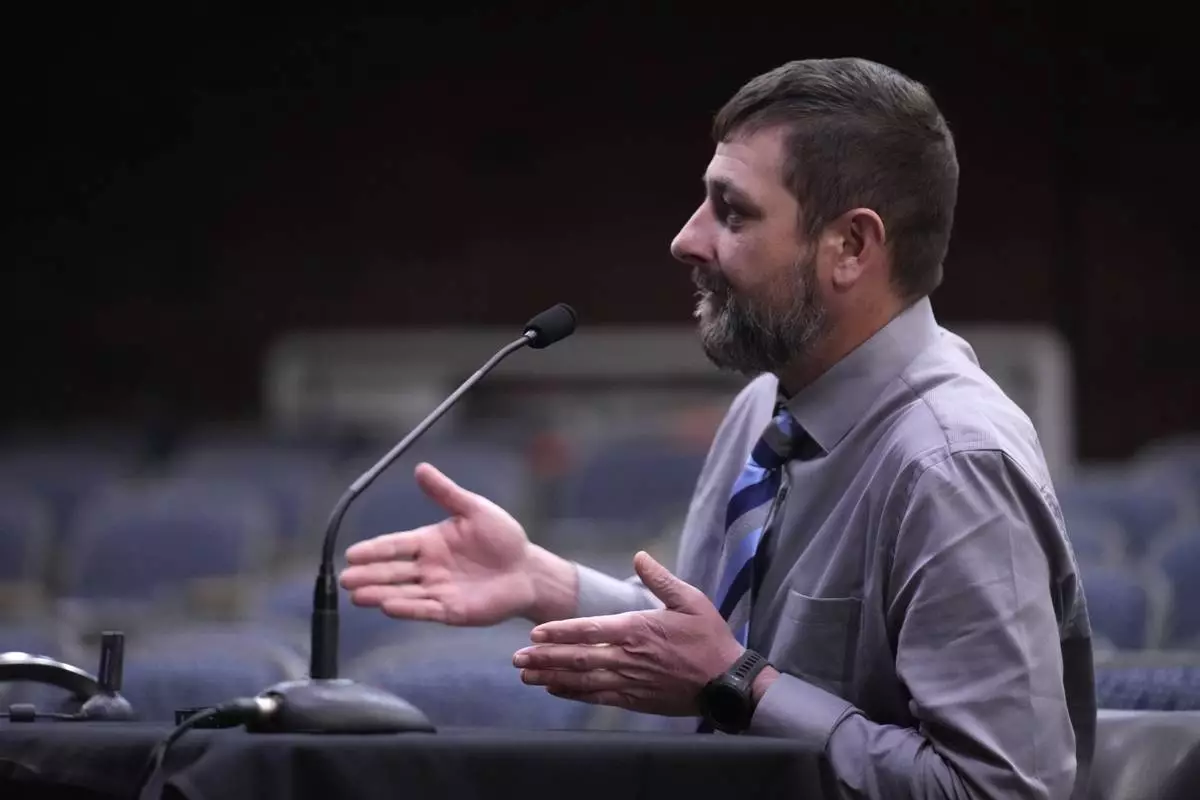
Sean Hodgson, a member of the U.S. Army Reserve, gives testimony, Thursday, April 25, 2024, in Augusta, Maine, during a hearing of the independent commission investigating the law enforcement response to the mass shooting in Lewiston, Maine. (AP Photo/Robert F. Bukaty)
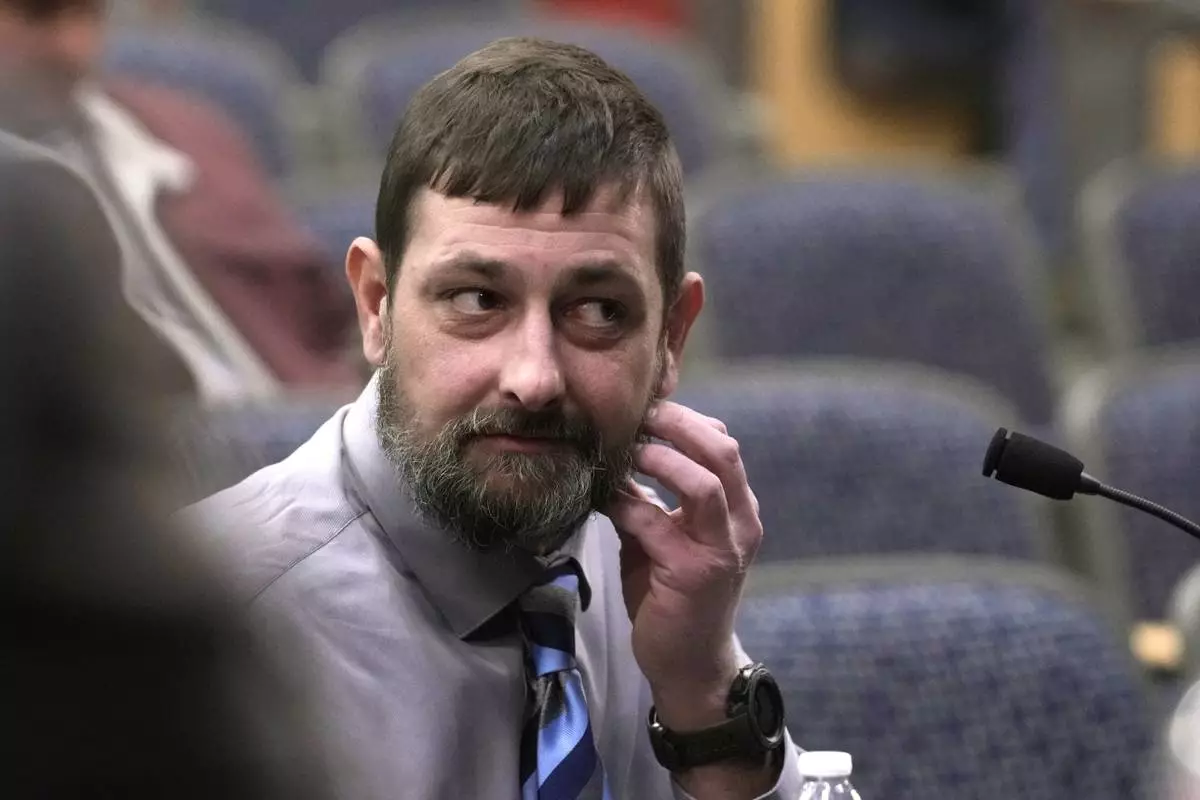
Sean Hodgson, a member of the U.S. Army Reserve, shows where he was punched by Robert Card while giving testimony, Thursday, April 25, 2024, in Augusta, Maine, during a hearing of the independent commission investigating the law enforcement response to the mass shooting in Lewiston, Maine. (AP Photo/Robert F. Bukaty)
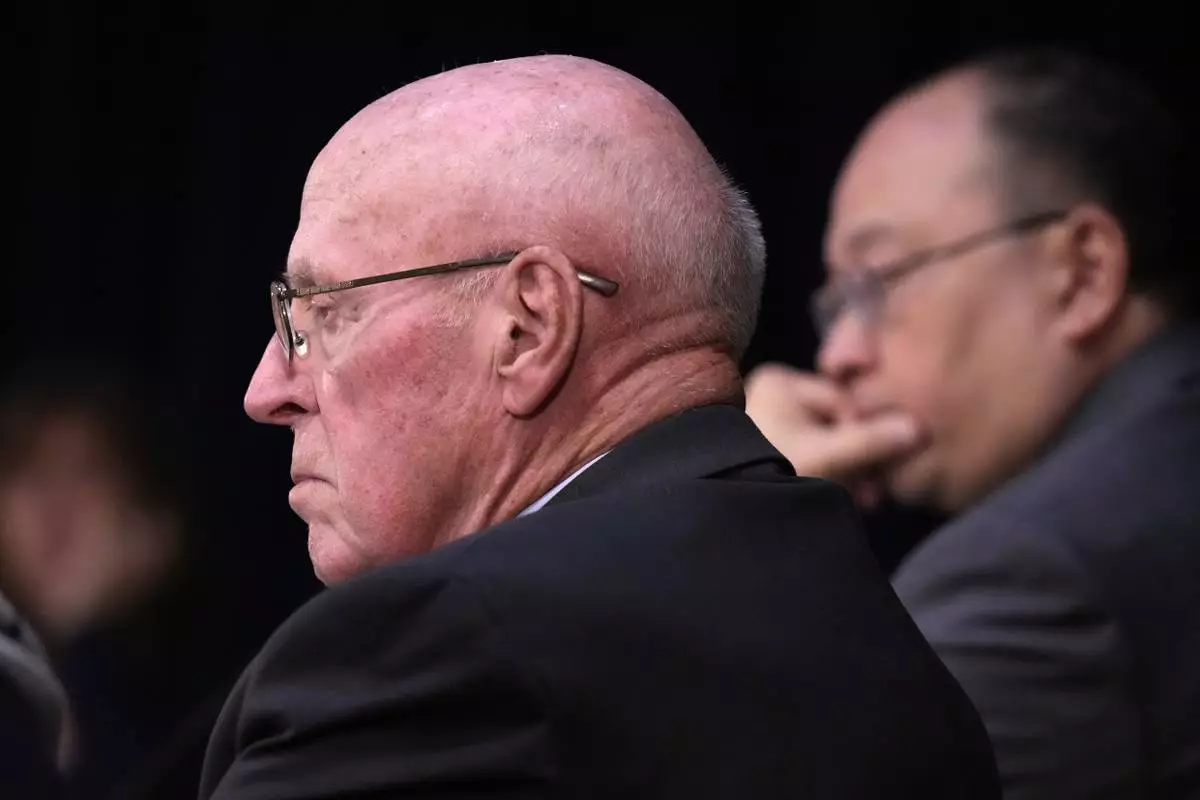
Daniel Wathen listens to testimony, Thursday, April 25, 2024, in Augusta, Maine, during a hearing of the independent commission investigating the law enforcement response to the mass shooting in Lewiston, Maine. (AP Photo/Robert F. Bukaty)
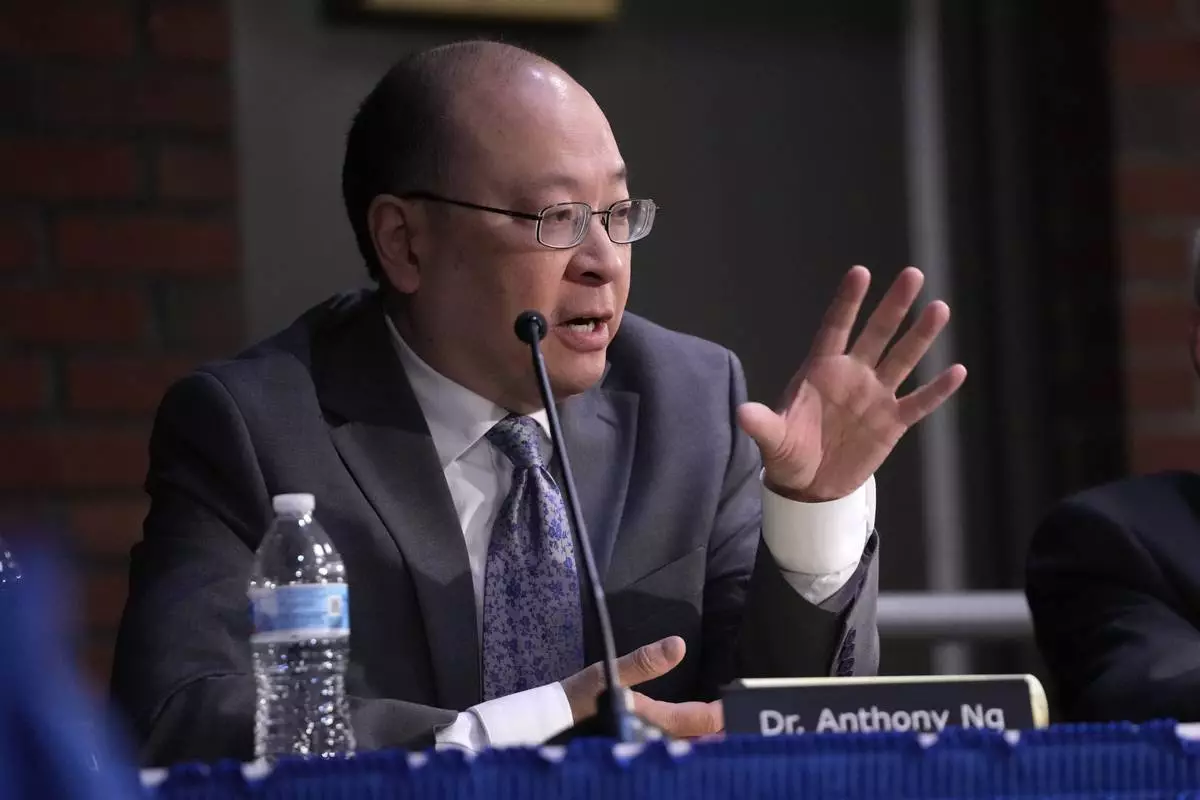
Dr. Anthony Ng questions a witness, Thursday, April 25, 2024, in Augusta, Maine, during a hearing of the independent commission investigating the law enforcement response to the mass shooting in Lewiston, Maine. (AP Photo/Robert F. Bukaty)
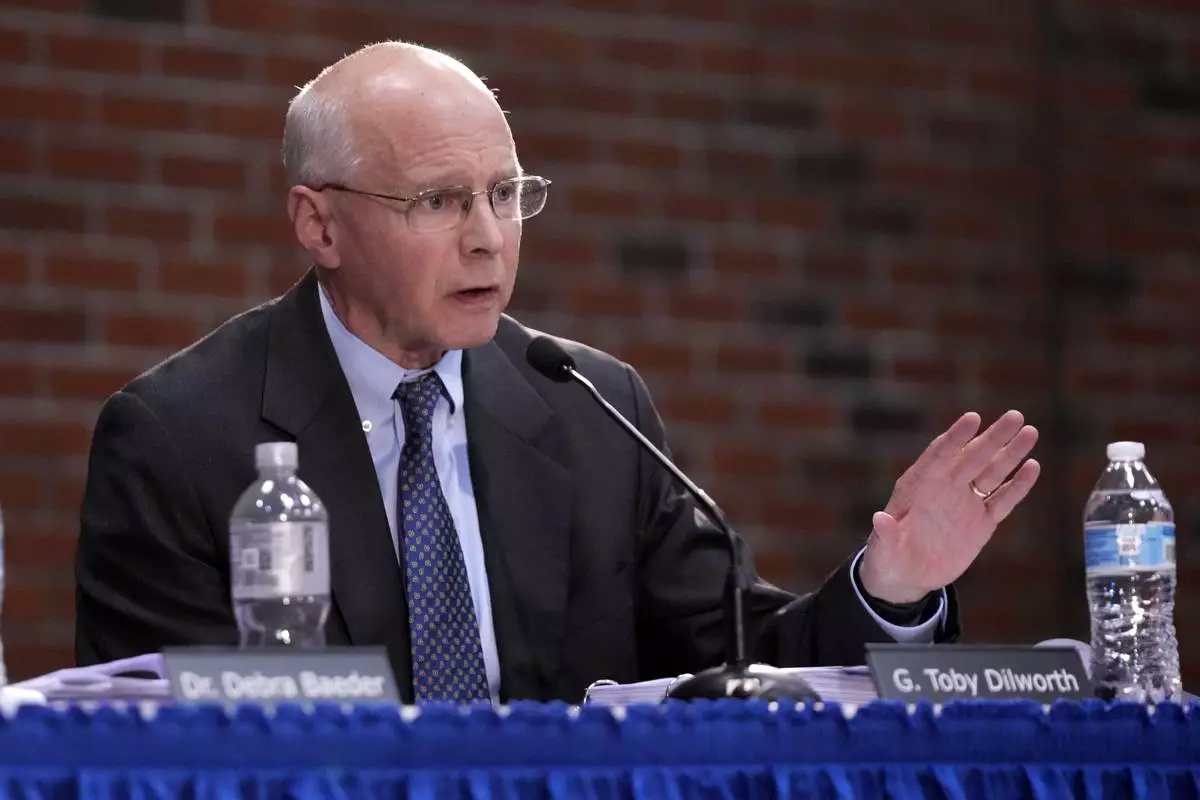
Toby Dilworth questions a witness, Thursday, April 25, 2024, in Augusta, Maine, during a hearing of the independent commission investigating the law enforcement response to the mass shooting in Lewiston, Maine. (AP Photo/Robert F. Bukaty)
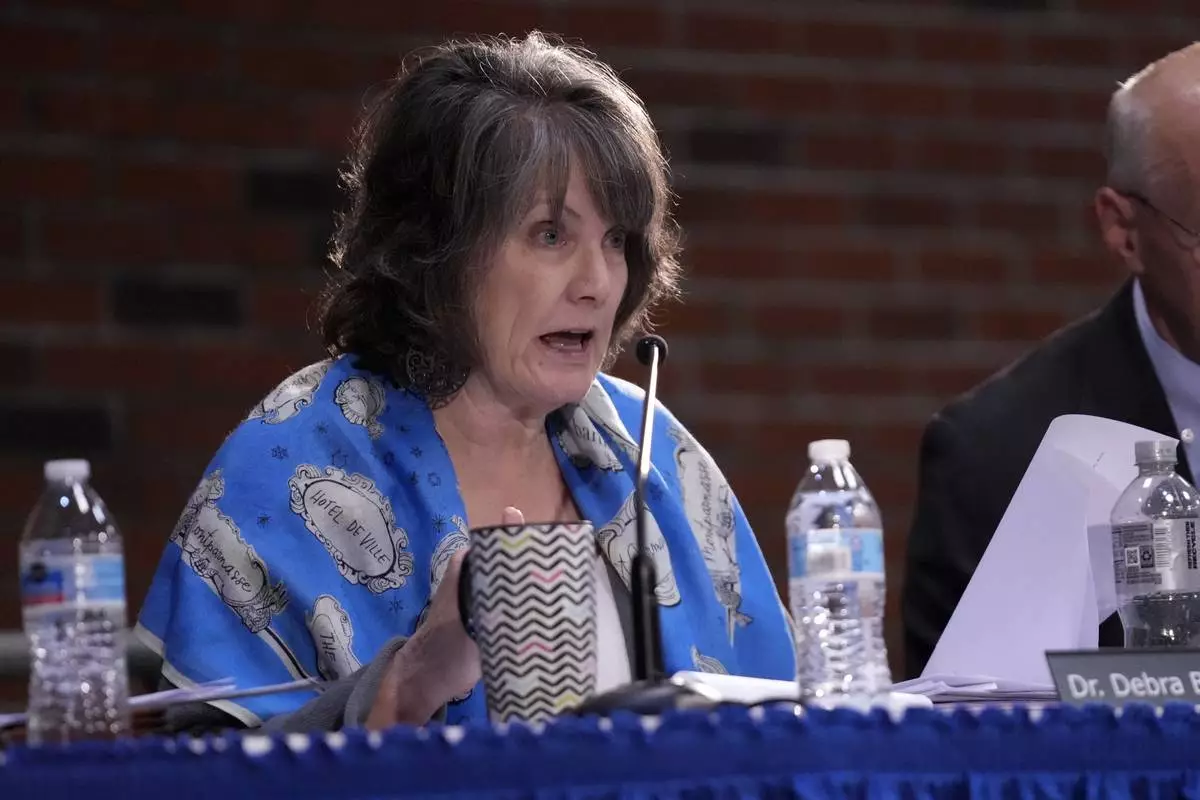
Dr. Debra Baeder questions a witness, Thursday, April 25, 2024, in Augusta, Maine, during a hearing of the independent commission investigating the law enforcement response to the mass shooting in Lewiston, Maine. (AP Photo/Robert F. Bukaty)
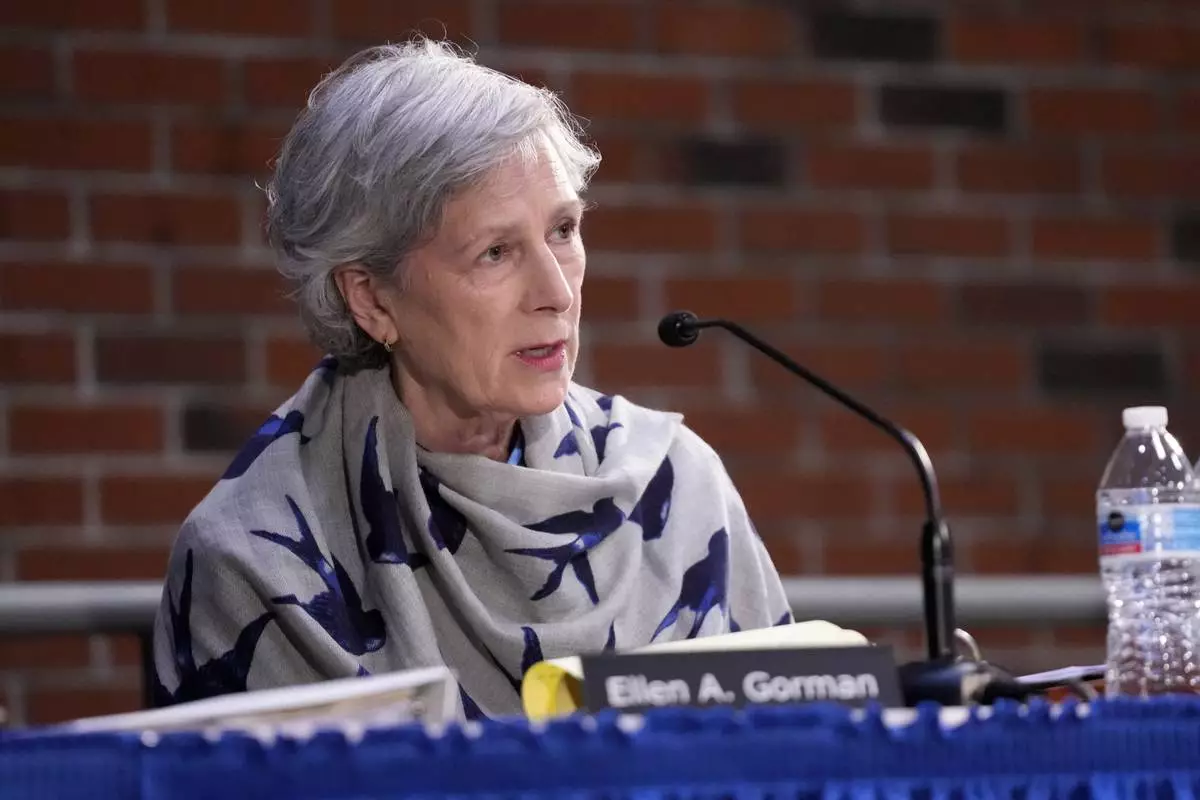
Ellen Gorman questions a witness, Thursday, April 25, 2024, in Augusta, Maine, during a hearing of the independent commission investigating the law enforcement response to the mass shooting in Lewiston, Maine. (AP Photo/Robert F. Bukaty)
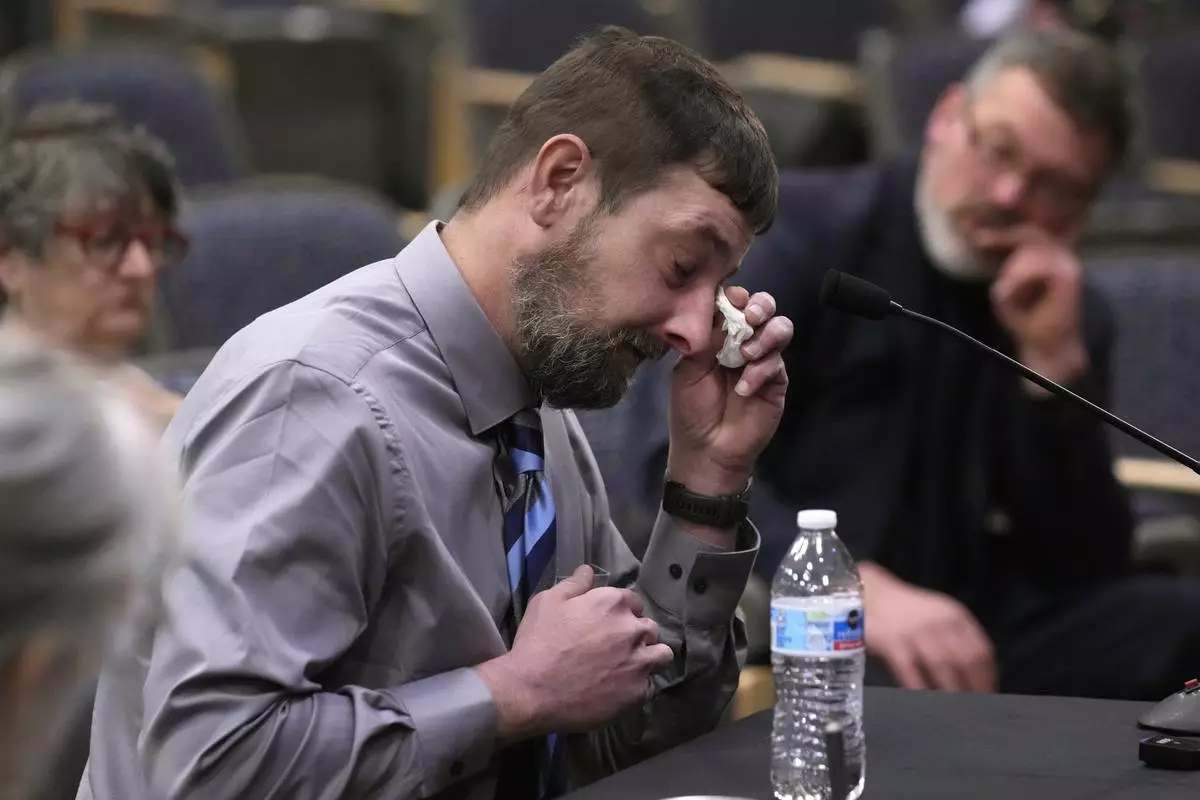
Sean Hodgson, a member of the U.S. Army Reserve, wipes tears while recalling the moment he heard about the mass shooting, Thursday, April 25, 2024, in Augusta, Maine, during a hearing of the independent commission investigating the law enforcement response to the mass shooting in Lewiston, Maine. (AP Photo/Robert F. Bukaty)
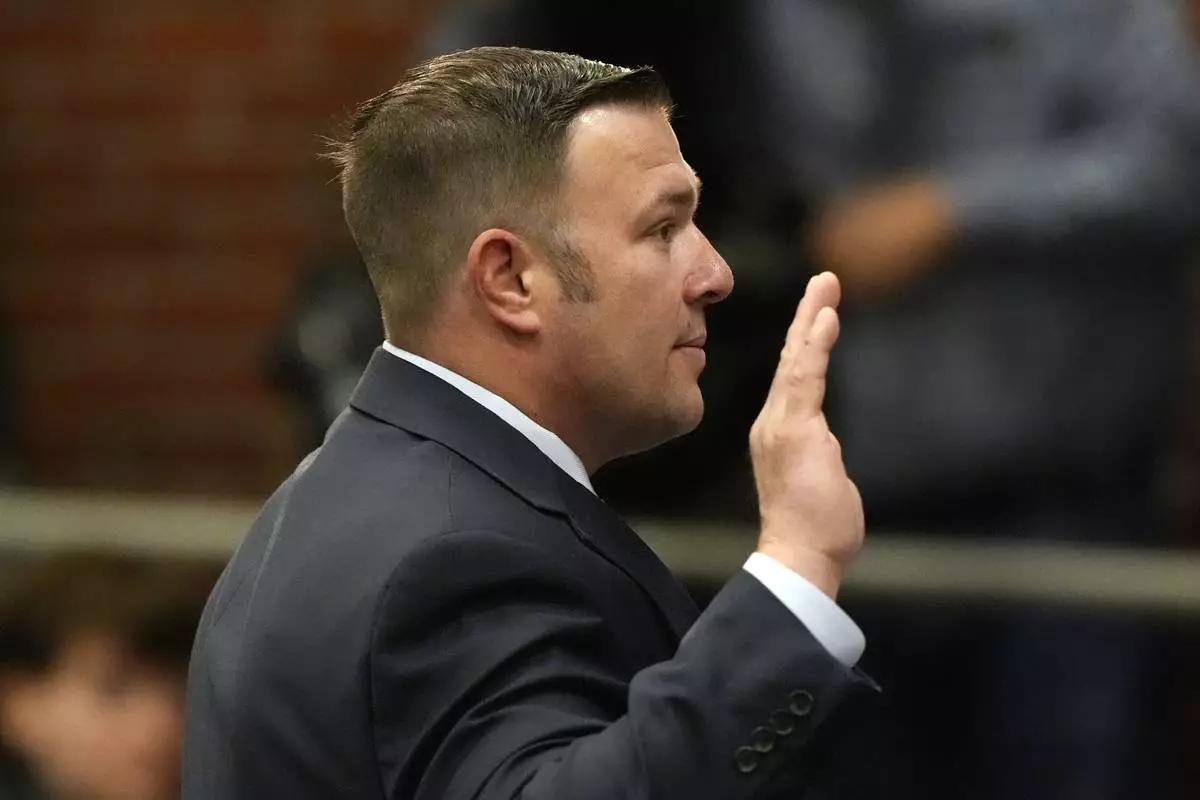
Daryl Reed, a member of the U.S. Army Reserves, is sworn in before giving testimony Thursday, April 25, 2024, in Augusta, Maine, during a hearing of the independent commission investigating the law enforcement response to the mass shooting in Lewiston, Maine. (AP Photo/Robert F. Bukaty)
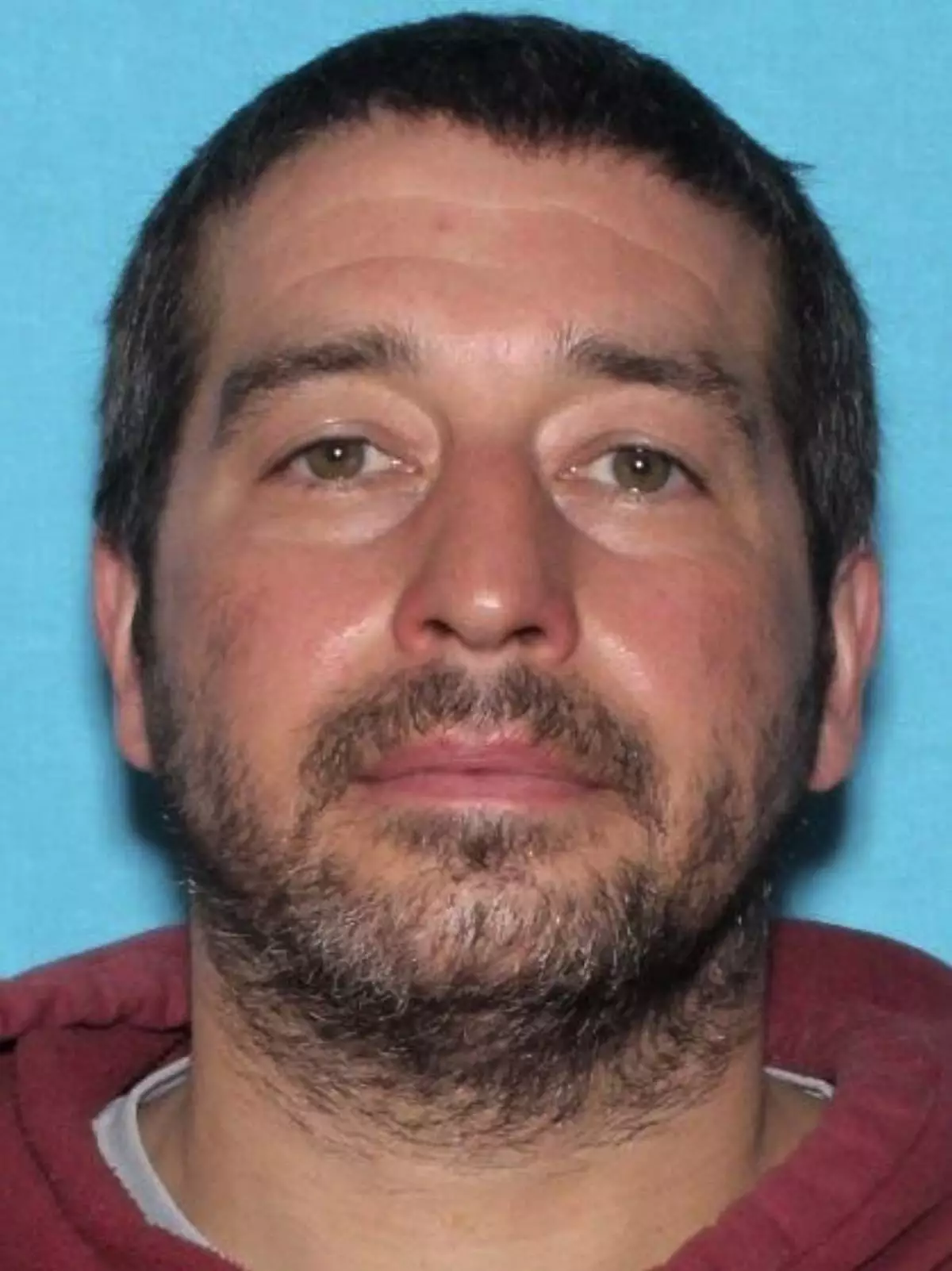
FILE - This photo released by the Lewiston, Maine, Police Department shows Robert Card, who was responsible for the mass shootings in Lewiston, Maine, on Oct. 25, 2023. Sean Hodgson, a fellow U.S. Army reservist who sounded the clearest warning ahead of Maine’s deadliest mass shooting, is expected to answer questions Thursday, April 25, 2024, from the commission investigating the tragedy. (Lewiston Police Department via AP, File)
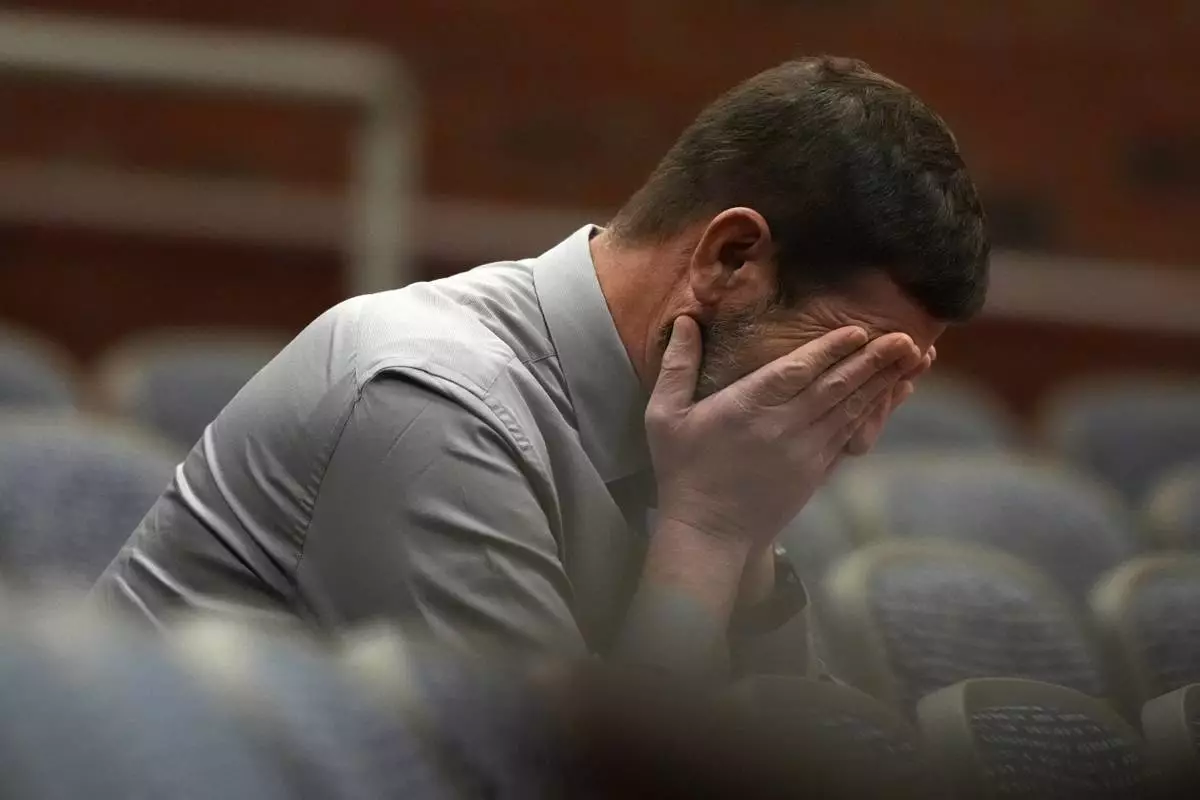
Sean Hodgson waits to be called to give testimony, Thursday, April 25, 2024, in Augusta, Maine, during a hearing of the independent commission investigating the law enforcement response to the mass shooting in Lewiston, Maine. Hodgson had alerted an Army supervisor in September that his friend, Robert Card, was capable to doing a mass shooting. (AP Photo/Robert F. Bukaty)
















